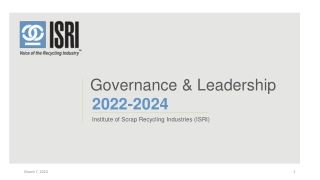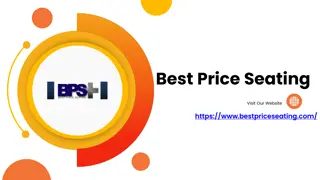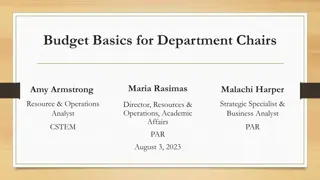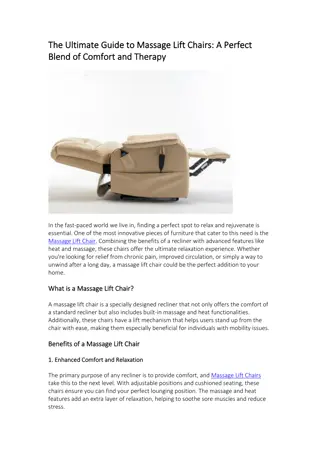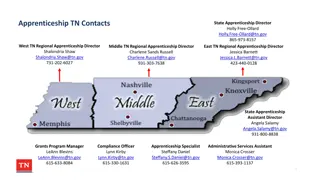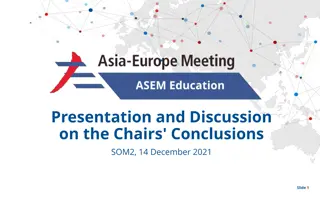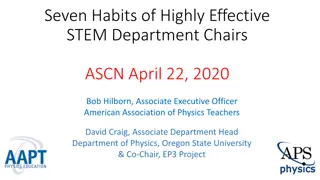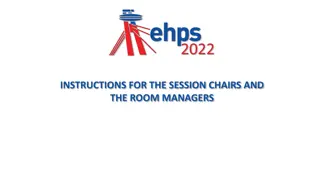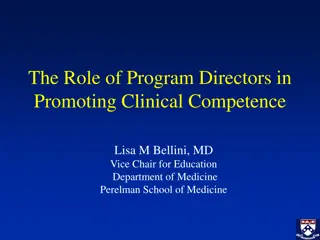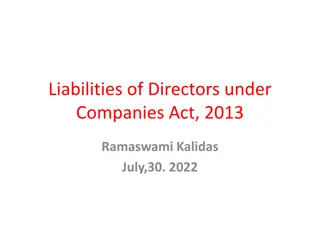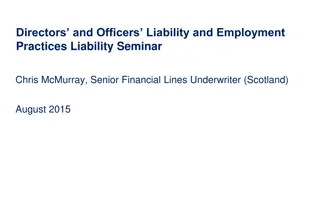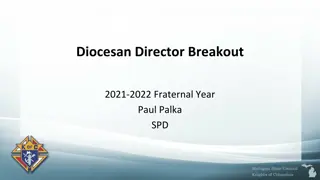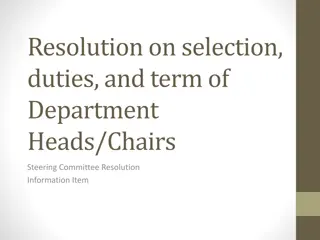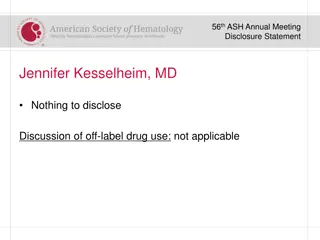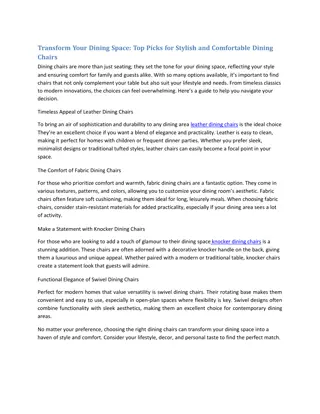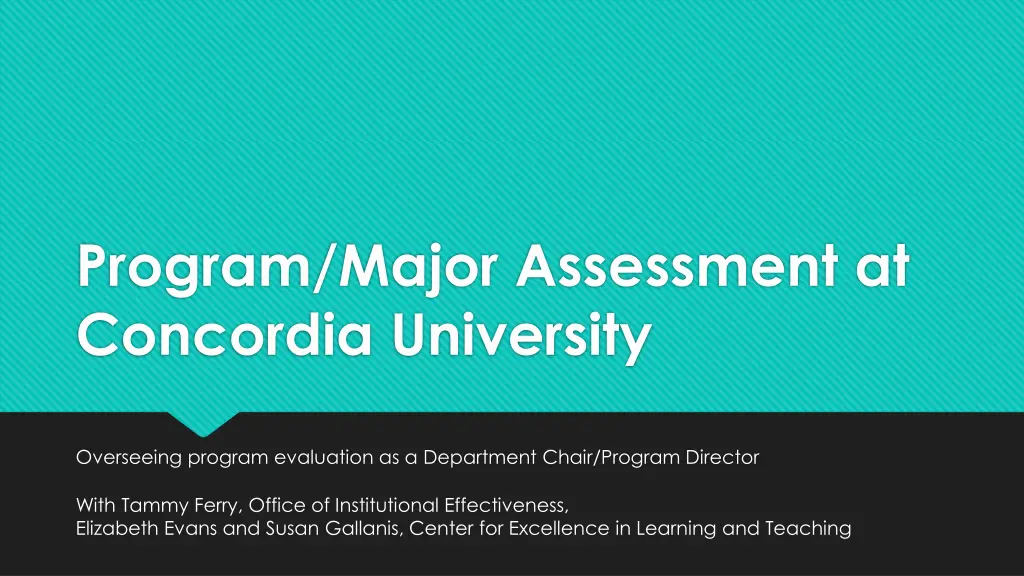
Assessment and Continuous Improvement at Concordia University
"Overseeing program evaluation and fostering continuous improvement at Concordia University with a focus on global learning outcomes, integrated disciplinary knowledge, critical thinking, and communicative fluency. Faculty collaborates to align, reflect, and improve teaching practices to fulfill the institution's mission effectively."
Download Presentation

Please find below an Image/Link to download the presentation.
The content on the website is provided AS IS for your information and personal use only. It may not be sold, licensed, or shared on other websites without obtaining consent from the author. If you encounter any issues during the download, it is possible that the publisher has removed the file from their server.
You are allowed to download the files provided on this website for personal or commercial use, subject to the condition that they are used lawfully. All files are the property of their respective owners.
The content on the website is provided AS IS for your information and personal use only. It may not be sold, licensed, or shared on other websites without obtaining consent from the author.
E N D
Presentation Transcript
Program/Major Assessment at Concordia University Overseeing program evaluation as a Department Chair/Program Director With Tammy Ferry, Office of Institutional Effectiveness, Elizabeth Evans and Susan Gallanis, Center for Excellence in Learning and Teaching
Global Learning Outcomes (GLOs) 1. Christian Faith Our graduates are grounded in the Christian faith while also recognizing other major worldviews and how they differ from a Christian understanding of the world. 2. Service and Global Citizenship Our graduates are globally-minded citizens. =What we want each graduate to look like when they walk across the stage and when they serve Christ in the church and the world. 3. Integrated Disciplinary Knowledge Our graduates integrate insights from a wide range of disciplines. 4. Critical Thinking/Creative Problem Solving University graduates are well developed in mind, body, and spirit, fulfill their vocations, and serve Christ in the Church and the world. Our graduates think rationally, critically, and creatively. 5. Communicative Fluency https://www.cuw.edu/about/offices/instit utional-effectiveness/outcome- statements.html ULAOs are on this page Our graduates communicate effectively. 6. Analytical Fluency Our graduates work with data effectively.
Global Learning Outcomes (GLOs) Service and Global Citizenship 1. 2. Our graduates are globally-minded citizens. 3. Integrated Disciplinary Knowledge =What we want each graduate to look like when they walk across the stage and when they serve Christ in the church and the world. Our graduates integrate insights from a wide range of disciplines. 4. Critical Thinking/Creative Problem Solving Our graduates think rationally, critically, and creatively. University graduates are well developed in mind, body, and spirit, fulfill their vocations, and serve Christ in the Church and the world. 5. Communicative Fluency Our graduates communicate effectively. 6. Analytical Fluency Line up with your PLOs Our graduates work with data effectively.
Continuous Improvement Process: Faculty Working Together ALIGN & PLAN REFLECT & IMPROVE: Meet to reflect on learning, make conclusions about the data, and plan improvements to implement next year When you create or revise curriculum Develop a plan for students to attain the mission through, coursework and experiences DELIVER & MEASURE Deliver curriculum each year & measure its effectiveness
Continuous Improvement Cycle Align, Plan, Deliver, Evaluate, Reflect, Improve DELIVER & MEASURE Plan: Create program learning outcomes (PLOs) Align to GLOs (identify best alignment) Curriculum Map: where learning on each PLO is initiated (entry- level), developed, and evaluated at the exit level? Build out syllabi/learning outcomes/learning activities/evaluations Reflect Collaborate to review collected data Make Conclusions: Compare learning to desired level Improvements: Make changes necessary going forward Submit annual report; track to dos and improvements Deliver: Teach program Measure exit level knowledge on each PLO in a cycle (required) Measure entry level performance (optional) ALIGN & PLAN REFLECT & IMPROVE
Faculty work together to review and Improve Program Learning Outcomes and so they better align with the GLOs Assessment of Student Learning Outcomes Work QI: Measurable meaningful PLOs describe exit level learning QI: PLOs align with GLOs; PLO for GLO #1 is explicit on Christian Faith Every major, graduate program and stand alone certificate must address all six GLOs Departments are doing both: Program-level work is about the program PLOs. University-level work is about the GLOs Suggestion: Line up PLOs to GLOs and use one set of measures for both goals. Develop and keep current a curriculum map to show how GLOs are connected to PLOs, where PLOs are taught and evaluated in courses. QI: Is there a Curriculum Map thatlists all PLOs and where introduced, developed and Entry/Exit Assessment points Details on this work will be covered in Curriculum Development session in May/June
Deliver your courses and measure your Program Learning Outcomes (PLOs) annually on a cycle appropriate for your program QI: Measure student work products with Tools and Faculty Evaluation that are effective QI: Direct Data is collected, evaluated, reported QI: Recommendations for changes are made and implemented Assessment of Student Learning Outcomes Work Program Faculty and Staff evaluate how well students have met the program learning outcomes when students complete the program. QI Evidence of Collaborative Work with faculty/staff working on curriculum and assessment QI: Submit annual reports in June separate data by campus QI Overall goal: Data is used for improvement in learning Every program reflects on the data, makes conclusions, and recommends changes to improve student learning
University-level Data Collection on the GLOs We use Program-level data that is aligned with each GLO as our university-level GLO data. We improve assessment processes with a FOCUS GLO each year. We ask you to report your assessment process and the GLO of the Year using the University Common Scale on the annual report. FOCUS GLO of the Year 2018-2019 #5 Communicative Fluency 2019-2020 #1 Christian Faith 2020-2021 #4 Critical Thinking/ Creative Problem Solving 2021-2022 #2 Service and Global Citizenship University-level process and data is about the university GLOs.
2021-2022 FOCUS GLO #2 Service and Global Citizenship Categories 2.1 Service: Demonstrate Christ-like care, help, respect when providing service, or knowledge of how to serve others. 2.2 Engagement with Diverse People: Recognize the diversity of God s creation through cultural understanding of others and knowledge of self. (includes ULAO 2b) 2.3 Stewardship: Recognize the free and joyous activity of managing life s resources for God s purposes.(includes ULAO 2c) 2.4 Citizenship: Use political and non-political processes to promote quality of life in the community. (includes ULAO 2a/2d) 2.5 Other/Undifferentiated: Not one of the above. Our graduates are globally minded citizens Steps: How does your PLO align with the categories? Do your lessons (teaching), your student products (demonstration of learning) and evaluation (faculty assessment of learning) also line up? Choose the one it fits the best. Consider improvements to line up your assignments to better address your program learning outcomes, your program learning outcomes to better address the GLOs.
Assessment of Student Learning Outcomes channel Faculty Tab of the Portal Annual report due June 30 Part 1 Narrative includes Curriculum Map with all PLOs, alignments to GLOs, narrative of all curriculum development and assessment activities (describe who was present to indicate collaboration), changes implemented from prior year, assignments (tools) in courses identified for entry-level measurement (optional) and exit-level measurement of the PLOs aligned with FOCUS GLO. Part 2 Data for FOCUS GLO, by campus, for entry-level (optional) and exit-level, category, Conclusions, Recommended Improvements, and Impact of past changes http://celt.cuw.edu/2020-2021-academic- program-assessment-reporting/ Assessment Resources and Tools During the year, deliver and measure In Summer, reflect, improve, plan and align Submit report in summer Annual Assessment PARTY each August for all Chairs/Program Directors /Assessment Coordinators Dec 31 last day to submit last year s report
Quality Indicators for Programs Quality Indicators to be used in feedback to departments/programs Measurable meaningful PLOs describe exit level learning PLOs align with GLOs, & PLO for GLO #1 is explicit on Christian Faith Is there a Curriculum Map thatlists all PLOs and where introduced, developed and Entry/Exit Assessment points. Collaborative Work with faculty/staff working on curriculum Tools of Student Work Products/Faculty Evaluation are effective Direct Data is collected, evaluated, reported Recommendations for changes are made and implemented Turn in annual report with data separated by campus Overall goal: Data is used for improvement in learning How do we know programs are using an effective process?
The 2021-2022 Work Curriculum map showing PLOs to GLOs, where PLOs are initiated, developed and assessed at the entry-level (optional) and exit-level (required). Should show at least GLOs alignment with 1, 2, 4, and 5. Report activities of collaborative work, data, conclusions, changes recommended on Service and Global Citizenship (FOCUS GLO) or other [4Critical Thinking, 1Christian Faith, or 5Communicative Fluency if you didn t complete #2 this year.] Forms for next year reports out in April, Mach Form will be similar to last year Likely we will FOCUS on #3 and #6 next year to wrap up first round http://celt.cuw.edu/2020-2021-academic-program-assessment-reporting/
EAC for Program Assessment Wrapping up 2nd year of implementing EAC Implemented over 20 CUWAA programs Connected to Blackboard pulls student assessment data from Blackboard rubrics and Tests. EAC creates the reports showing the data. GLO/PLO assessment using Blackboard rubrics Some consistent structure across the university is needed for GLO reporting across programs Programs have several options for rubric types (overview video) EAC can be used for specialized accreditation data gathering and reporting In Blackboard, GLOs and PLOs are called Goals. Do not align anything to Blackboard Goals unless your program is working with Susan Gallanis to implement EAC. Contact Susan Gallanis (susan.Gallanis@cuw.edu, 262-243-2007) for a demo. Individual instructors can use EAC to look at student performance for their courses. Watch for program details, planned for March, 2022.

